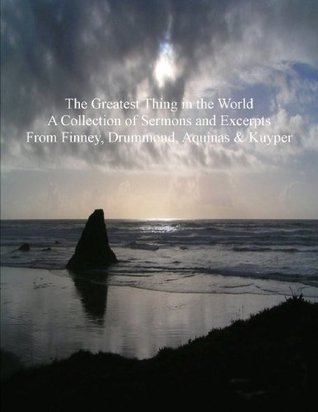- Bible
- Read the Bible
- Bible Versions
- Verse of the Day
- Reading Plans
- Verses by Topic
- Books of the Bible
- Bible Images
- Study
- Commentaries
- Concordances
- Dictionaries
- Encyclopedias
- Sermons
- Bible Atlas & Maps
- BP Wiki
- Devotionals
- Today's Devotionals
- Light of the World
- All Devotionals
- Inspirational Quotes
- More
- Picture Quotes
- Videos
- Inspirational
- Bible Study
- What The Bible Says
- Bible Q&As
- Daily Bread
- Bible by Genre
- Bible Stories
- Random Bible Verse
- Community
- Store
Love: The Greatest Thing in the World
by Charles G. Finney
Sermons and excerpts from Drummond, Finney, Aquinas and Kuyper on the topic of divine and human love.
The Greatest Thing in the World by Henry Drummond (1851-1897), quite possibly the most famous and well loved sermon on 1 Corinthians 13 in history.
God's Love Commended to Us by Charles G. Finney (1792-1875), a Presbyterian minister and the father of Revival Theology teaches on Romans 5:8
Of the Principal Act of Charity, Which is to Love by St. Thomas Aquinas (1225-1274) from his theological masterwork Summa Theologica asks such questions as "Is it better to love or to be loved?", "Can we truly love God?" and Is it better to love God or to love our neighbor?"
Love by Abraham Kuyper (1837-1920) is an excerpt from his book "The Work of the Holy Spirit" dealing with the differences between divine and human love and the dwelling of divine love in the human heart.
The Greatest Thing in the World by Henry Drummond (1851-1897), quite possibly the most famous and well loved sermon on 1 Corinthians 13 in history.
God's Love Commended to Us by Charles G. Finney (1792-1875), a Presbyterian minister and the father of Revival Theology teaches on Romans 5:8
Of the Principal Act of Charity, Which is to Love by St. Thomas Aquinas (1225-1274) from his theological masterwork Summa Theologica asks such questions as "Is it better to love or to be loved?", "Can we truly love God?" and Is it better to love God or to love our neighbor?"
Love by Abraham Kuyper (1837-1920) is an excerpt from his book "The Work of the Holy Spirit" dealing with the differences between divine and human love and the dwelling of divine love in the human heart.
BUY NOW
Kindle Edition, 66 pages
Published July 23rd 2009
© 2025 Bibleportal.com All rights reserved.

Charles Finney (1792 - 1875)
Known as one of the leaders in the Second Great Awakening revival in America. He was a revivalist who called for deep introspection of sin and preaching of the law to bring about sin. He was known to preach 30+ nights on sin and than the last night on Christ to have people flee to Him for mercy. Used greatly in the book: "Revivals of Religion" which is a classic on the subject of revival.He preached on the true Baptism of the Holy Spirit and its necessity. In his revivalistic campaigns he was used of the Lord to bring some estimate over 50,000 souls to the Lord which many were sound converts. There has been questions raised surrounding his theology in the later years of his ministry but this does not discredit that God used him powerfully in revival and for God's kingdom.
Charles Finney was born in Connecticut to an ordinary family and life that gave little hint of the great things God had in store for him. He was a schoolteacher and then a lawyer before his conversion at age 29. Finney was filled with the Holy Spirit on the same day he was saved and immediately began witnessing to friends and family members. More than twenty people were saved in the 24 hours following Finney's conversion. Finney's personal evangelism soon became public evangelism as he began to travel and preach in extended revival meetings. He considered revival to be a natural result of following the instructions God had laid out in His Word.
During Finney's fifty years of preaching, more than 500,000 were saved. He wrote many books, the most enduring of which are The Autobiography of Charles Finney and Lectures on Revival of Religion. After ill health forced him to stop traveling in meetings, he accepted the pastorate of a church in New York City. From 1852 until 1866 he served as president of Oberlin College in Ohio. Although some of his theology was lacking, he was a powerful, Spirit-filled soul winner who brought revival to cities and towns across the eastern United States.
... Show more